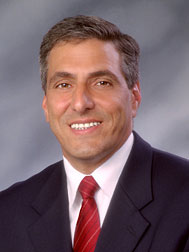Hazleton, Pennsylvania remains in the national spotlight as it fends off the ACLU, Puerto Rican Legal Defense and Education Fund and illegal aliens and their supporters. The case entitled Lozano v. City of Hazleton, was brought against the city on the constitutionality of its ordinance, the Illegal Immigration Relief Act, which can pull the licenses of business that hire illegal aliens and fine landlords who rent to them.
The trial is being held in Scranton at the William J. Nealon Federal Building with US District Judge James Munley overseeing the case. The ordinance has not been in effect since it passed in October 2006 and Judge Munley placed a temporary restraining order on enforcement of the ordinance. The case is expected to run through the end of next week.
Illegal Immigration Relief Act Revised

Mayor Lou Barletta |
Thursday night, after
day 4 in the Hazleton trial, the Hazleton City Council made some minor changes to the ordinance that took out three words that plaintiffs had been using against them.
The revision eliminated “solely or primarily.” from this portion of the ordinance.
“A complaint which alleges a violation solely or primarily on the basis of national origin, ethnicity, or race shall be deemed invalid and shall not be enforced.”
Mayor Lou Barletta said that the plaintiffs have been twisting the meaning, which initially was added to prevent racial discrimination. Plaintiffs claim that it still left open a loophole to use racial discrimination in some cases. The change was recommended by Hazleton attorney Kris Kobach.
The five member city council consisting of President Joe Yannuzzi, Vice President Jack Mundie, Tom Gabos, Bob Nilles, and Evelyn Graham voted in favor of the revision by a vote of 4-0. Tom Gabos not present for the vote.
Day 5 In The Hazleton Trial
Day 5 began on Friday and focused around the preparedness of the city to enforce the ordinance and the financing of the ordinance. These two items are once again irrelevant to the case, which is about the constitutionality of the ordinance, not the enforcement of the ordinance.
Let me preface the witness testimony below by pointing out that if there are violations or malicious intent in enforcing them then that is the time to address the issue, not speculating that the laws could be used by disgruntled individuals for revenge. There are currently ordinances in many towns and cities that could be used maliciously, such as noise ordinances across the nation, that are perfectly constitutional.
Plaintiffs Question Funding Of Ordinance

Thomas Fiddler, Plaintiff |
Attorney
Thomas Fiddler questioned
city Administrator Samuel Monticello on a line item in the city's budget that showed the city would receive $105,400 through a $10 fee that would be collected under the act from tenants. His specific questioning seemed to be along the lines of whether the estimated costs of enforcing the act were overinflated and said “they intend to make money on [the occupancy permits]. The question is how much, and the reason. The bottom line is that the expenses that would be generated don’t come close to what the fee revenue would be. What conclusions can be drawn from that?”
So? If the people in the city find it unfair they can vote out the city council and Mayor. How this has any relevance on the case that was brought is beyond me. The $10 is a one time fee unless the tenant moves. So this would not be some sort of yearly tax if that is what Mr. Fiddler is implying. And even if it was, how does that relate to this case?
Costs Of Enforcing The Ordinance
Fiddler pointed out that the city would have to set up an office and staff to accept and process the fees and provide overtime pay for police and training. Monticello said the clerk for processing the fees would work 25 hours a week at $10 an hour and that the city had already bought a chair, computer, software and filing cabinets.
How this line of questioning regarding costs relates to constitutionality I have no idea and I'm not sure why the Judge is allowing it to continue.
Mayor Lou Barletta had said earlier in the trial that the city faced a $200,000 deficit last year - down from a $300,000 surplus in 2004 - and that about $75,000 of that consisted of overtime pay for police. When Barletta took office in 2000 the city had a $1.2 million deficit.
Fiddler then continued on the worn out path that the plaintiffs have been pushing throughout the trial, whether the city could break out the actual costs of police overtime that could be directly attributed to illegal aliens. As I've stated in earlier coverage of this trial, it is a federal law that police and prisons cannot ask an individual about their legal status in the United States due to laws that have been pushed through by the likes of the ACLU and proponents of illegal aliens. A convenient law that hides the real impacts and costs of illegal aliens on this country from Americans. If the true costs were known there would probably be a revolution.
City Preparedness
Thomas Fiddler questioned Public Works Director Bob Dougherty and brought up that legal residents and American Citizens might have trouble proving their legal status. Really? I find this quite hard to believe and it's been brought up as an argument in other immigration related debates such as federal bills requiring a photo ID to vote like a drivers license.
Fiddler questioned Dougherty on how prepared the city was to enforce the ordinance and ensure that malicious intent or racial discrimination wasn't involved. Dougherty stated that he "can’t determine motivation. We have to review the complaint. There may be hidden motivation”.
Fiddler pointed out that immigration is a subject that the department hasn't dealt with before and asked why the city hadn't trained workers or made up forms yet that the act would need. Dougherty pointed out that they had ceased going forward with preparation for the act because of the injunction and awaiting the outcome of the court case.

Kris Kobach, Hazleton |
Under examination by
Hazleton attorney Kris Kobach, Dougherty said the department usually throws out complaints if they realize that it is based on a feud and that they typically try to resolve complaints in the city without actually filing a citation. He said that they would enforce the ordinance the same way.
Dougherty also pointed out that there would be a 4 month window for training to occur before enforcement actually took place because they would have to allow time for tenants to get registered with the city.
Two Code Officers, Richard Wech and Paul Kattner, were called to the stand and testified that they hadn't been trained yet to enforce the ordinance. Fiddler pointed out the fact that advertisements that told tenants to register under the ordinance were only in English and that Spanish speakers may not know that they needed to register. Kattner did testify that he had forms in Spanish available, but had turned them over to Mayor Lou Barletta when the city passed its law making English the official language.
Testimony in the case ended early Friday because of a snowstorm and can be picked up where it left off on Monday.
My Thoughts On Day 5
I don't believe that anything was accomplished today by the plaintiffs in proving that the Illegal Immigration Relief Act is unconstitutional. All they managed to do is show that bureaucracy is slow. Something we all knew before this trial began.
Regarding the unpreparedness of the city Kris Kobach said “We think this is a silly argument, the only reason the city hasn’t done (anything to prepare) is because of the [restraining order].”
As a side-note, do you remember the Lechuga's from day 1?
They've been held up by those in the community against the IIRA as the typical legal business that is being forced to close because of the ordinance. Well there's a nice little piece over at the Post-Gazette on the falsehood of this "typical couple".
Mr. Lechuga admitted under oath that he and his wife had failed to make their mortgage payments for months before the ordinances targeting illegal immigrants were approved. He said his Hazleton stores collapsed after he opened a second unprofitable market on the outskirts of the city.
Even more damning, Mr. Lechuga testified that most of his customers at the suburban store were illegal immigrants, primarily construction laborers. After the workers were caught in a federal raid, his suburban store had to be shuttered and he spiraled into debt.
When your business is built around a supply of criminals as customers, don't complain when it false apart and you go bankrupt when they are arrested and no longer shop there.
Mayor Barletta said Hazleton has gained 27 Latino-owned businesses since the closing of the Lechuga's stores.
There's another nice exchange in the article that I missed in my earlier coverage. When Vic Walczak, an ACLU attorney for the plaintiffs, asked Mayor Barletta "Have you ever said illegal is illegal?", Barletta replied "I think it will be on my tombstone,".
Be sure to check out the recap of the other days of coverage in my Hazleton Archive
Hazleton needs funding. You can donate to their legal defense fund at Small Town Defenders. Their case could set the stage for reduced illegal immigration throughout this country, so donate today!
Sources:
Hazleton Standard Speaker 1 2; Times-Leader 1

